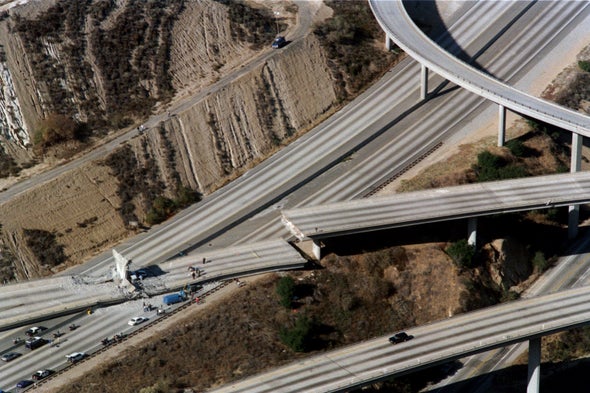If we can predict hurricanes, floods, and tornados to differing degrees of reliability, why don’t we know when the next big earthquake will come?


My hometown of Los Angeles is home to the earliest reported earthquake dating back to 1769 (and, of course, many more since then). The largest recorded earthquake in the world occurred in Chile in May of 1960 measuring at a magnitude of 9.5 moment magnitudes. A single earthquake can cause destruction costing hundreds of millions of dollars to repair and, far more importantly, can end in fatalities.
In 2009, scientists in Italy were convicted of manslaughter for failing to predict the L’Aquila earthquake that killed more than 300 people. But how successful can we expect our quake predictions to be?
In the United States, the scientific experts on all things geology are at the US Geological Survey. Their webpage on earthquake prediction starts: “Neither the USGS nor any other scientists have ever predicted a major earthquake. We do not know how, and we do not expect to know how any time in the foreseeable future.” Well, that is pretty clear!
But why not? If we can predict hurricanes, floods, and tornados, although to differing degrees of reliability, why don’t we know when the next “big one” is going to happen when it comes to earthquakes?
What is an earthquake?
To understand the challenges involved in predicting an earthquake, and what is lacking in our current efforts to make those predictions, we need to know what causes an earthquake.
Our understanding of what makes an earthquake happen is based on the theory of plate tectonics, or the idea that the Earth’s outer crust is composed of movable slabs of rock called plates. These plates can shift around on top of the rocky yet more malleable inner layer below them, called the Earth’s mantle, which sits above the molten material of the Earth’s core. Our modern theory of plate tectonics has only been around since the 1950s and it is thought that there are nine major plates. Along the boundaries of each of these plates are many fault lines, where most of the planet’s earthquakes are known to occur.
Sometimes during their relative shifting, these tectonic plates bump into one another as they attempt to slide past. The jagged boundary edges of these plates get stuck, while the rest of the plate continues to move, storing up energy along the plate boundary in the process. Once the inner portion of the plate has moved enough to force the edges to overcome the friction holding them together to become unstuck, that stored energy radiates away in waves rippling through the Earth’s rocky surface. These waves shake the ground as they move through it, and an earthquake occurs.
Why can’t we predict earthquakes?
If we understand how earthquakes occur, why can’t we predict when they will happen? An effective earthquake prediction includes four components: the date, time, location, and magnitude of the expected quake. To determine how a possible early warning sign (or signs) may translate into these four factors requires scientists to either look for patterns in earthquakes that have already occurred or create sophisticated mathematical models of the movement of known tectonic plates.
For the first case, scientists have attempted to link multiple natural factors that have preceded earthquakes in the past with the earthquake itself, including increased amounts of radon in local water sources, rising levels of ground water, changes in electromagnetic activity and even odd animal behavior. For example, before the main rupture that ultimately causes a quake, smaller breaks called micro-fissures will form in subsurface rock. These smaller cracks change the rock’s permeability, or, in other words, they allow water to more easily pass through the rock. The more permeable rock might then lead to changes in ground water levels. This same change in permeability could also lead to the escape of radon which forms by radioactive decay of elements in certain minerals.
However, even if scientists can draw geological connections between these changes in nature and earthquakes, there has been very little evidence that one must occur with the other. Sometimes these events occur without an ensuing earthquake, and other times earthquakes occur without any of these precursor events. Earthquakes originate several miles below the Earth’s surface so it is of course possible that other early indicators occur, but we can’t readily detect them here on the surface, especially when we are not sure what it is we are looking for.
Without empirical evidence linking certain possible warning signs to earthquakes, scientists can instead attempt to model specific fault lines. However, constructing these models is incredibly challenging due in no small part to the difficulty in studying how rocks and minerals behave at the increased temperatures and pressures toward the Earth’s core. Such conditions are challenging to recreate in the lab, and although geologists have drilled boreholes in the San Andreas Fault Zone to study the conditions there, such efforts are expensive and not easy.
Another difficulty in earthquake prediction is that small earthquakes, those that register here on the surface only slightly or not at all, and larger earthquakes are thought to start the same way despite ultimately having different strengths and durations. Thus there may not be a simple way to decipher whether an early warning sign is an omen of a major, more destructive quake or a tiny tremble.
»Continue reading “Can We Predict Earthquakes At All?” on QuickAndDirtyTips.com
ABOUT THE AUTHOR(S)

Sabrina Stierwalt, PhD, is an astrophysicist at Occidental College and the host of the Everyday Einstein podcast on Quick and Dirty Tips.

